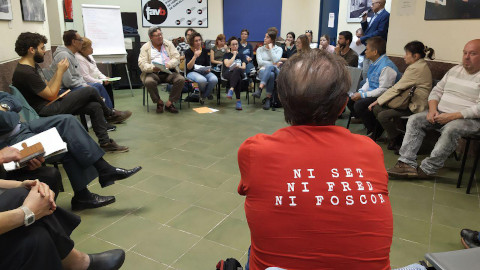Empowering women to tackle energy poverty in the Mediterranean

An international project led by the ICTA-UAB, Engineers without Borders Catalonia (ESF), and the Catalonia Energy Research Institute (IREC) contributes to address energy supply problems in 1,500 households in the Barcelona Metropolitan Area.
24/11/2020
Between 34 and 82 million Europeans suffer from energy poverty, according to the most recent statistics from the EU Energy Poverty Observatory (EPOV). These are millions of people who cannot afford a basic level of thermal comfort in their homes, spend a significant part of their income to pay for domestic energy, declare arrears in utility bills, or consume less energy than what would be necessary. Living in energy poverty results in unsatisfied basic needs, suffering physical and mental health problems, difficulties for an effective participation in society.
In Spain, data recently published by the Ministry for the Ecological Transition and the Demographic Challenge (MITECO) indicate that between 7% and 17% of households were affected by energy poverty in 2019. In addition, according to the Survey of Living Conditions (ECV) of the INE, at least 500,000 people suffered a supply disconnection due to economic difficulties in 2019. The unfolding health and economic crises due to the COVID-19 pandemic is worsening these conditions and emphasizing the role of domestic energy as an essential service for a safe, healthy and decent life. The impact of the crises on households is also exacerbating pre-existing gender-related inequalities.
In response to these challenges, the EmpowerMed project contributes to energy poverty abatement in coastal areas of the Mediterranean through practical action aimed at empowering affected households, with a focus on women and physical and mental health. In Spain, the initiative is led by the Institute of Environmental Science and Technology of the Universitat Autònoma de Barcelona (ICTA-UA), Engineers without Borders Catalonia (ESF), and the Catalonia Energy Research Institute (IREC).
Indicators of the EU Energy Poverty Observatory reveal high incidence rates in Mediterranean countries despite the milder climate of Southern Europe. People living in the region’s coastal areas face specific risk factors such as conflicting summertime and wintertime indoor thermal comfort demands, low levels of insulation and central heating, prevalence of electric modes of heat and cooling provision, and seasonal unemployment patterns related to tourism-based economies.
Women and women-led households are disproportionately affected by energy poverty. The EmpowerMed project asserts women as autonomous agents of their lives and of changes needed for energy poverty alleviation and a gender-just energy transition. The project focuses on tackling energy and gender inequalities through a range of practical actions (collective assemblies, household visits, do-it-yourself sessions and health workshops) that will improve the living conditions of more than 10,000 people (at least 60% of whom will be women). In doing so, EmpowerMed brings together 9 partners from 7 European countries (Albania, Croatia, France, Germany, Italy, Slovenia and Spain) to empower over 4,200 households affected by energy poverty.
In Spain, the pilot project will be carried out in the Barcelona Metropolitan Area, where more than 100,000 people live in inadequately heated homes and declare arrears in utility bills. Thousands depend on insecure connections to the energy and water supply because of poor access to affordable housing.
The pilot project in Spain will benefit 1,500 homes directly and indirectly in the Barcelona Metropolitan Area. To do this, the project carries out fortnightly collective advisory assemblies as a community tool for mutual support that based on people’s experiences and shared knowledge, allows confronting energy poverty collectively. In Barcelona, EmpowerMed will also undertake training activities on energy bills and markets, and awareness-raising and political advocacy workshops with local entities.